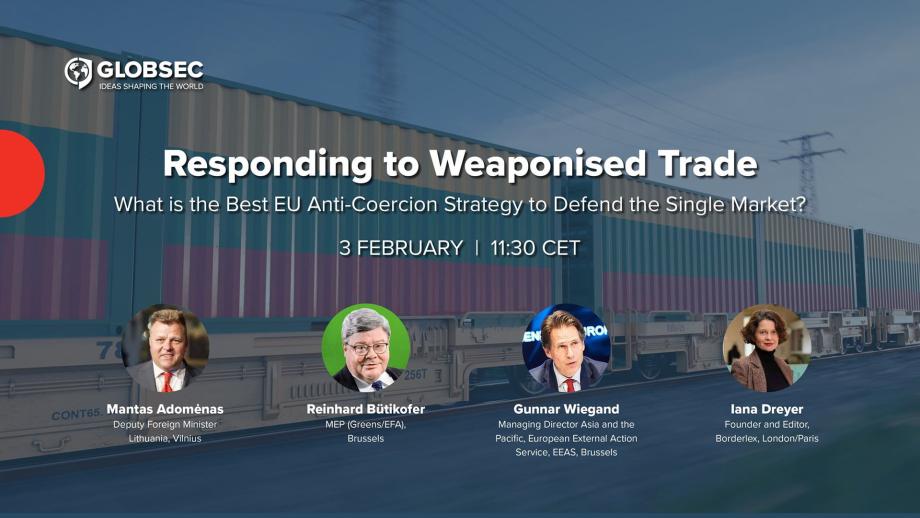GLOBSEC: Responding to Weaponised Trade – What is the Best EU Anti-Coercion Strategy to Defend the Single Market?

Zoom Webinar, 3 February 2022 (Thurssday), 11:30 – 12:45 CET
Key takeaways
1, Context and questions
Following Lithuania’s decision to deepen its relations with Taiwan, an unprecedented political and economic campaign by the Chinese government has started: Diplomatic relations were nearly cut off, and Lithuanian goods, as well as Lithuanian components in other countries’ exports are boycotted in China. This has severe consequences for political and economic cohesion in the EU. According to many commentators, the Single Market is at stake. A pan-European debate on how the EU should react to this crisis is in full swing, with an anti-coercion instrument and a complaint to the World Trade Organisation in central focus.
These are the main questions to be discussed:
- How should the EU react to the targeting of individual member states by the Chinese government and maintain solidarity and cohesion in the Single Market?
- What is the impact of Chinese actions on the International Liberal Order and what role can the World Trade Organization play in addressing the problem?
2, Speakers
- Mantas Adomėnas, Deputy Foreign Minister Lithuania, Vilnius
- Iana Dreyer, Founder and Editor, Borderlex, London/Paris
- Reinhard Bütikofer MEP (Greens/EFA), Brussels
- Gunnar Wiegand, Managing Director Asia and the Pacific, EEAS, Brussels
3, Key takeways
- The economic coercion measures of China made the pressure on Lithuania a European problem. The EU now has to stand up and defend the Single Market, which is at the core of European integration.
- The world is more dangerous and interdependent but institutions that underpin it are weakening. The EU must learn the language of power and develop a toolbox to fight coercion from the outside.
- The conflict is not about the name of the Taiwanese representative office in Vilnius. Calling it a Taiwanese office is well within the scope of the EU‘s One China policy. The best proof of this is that in Beijing itself, the authority dealing with Taiwan is called Taiwan Affairs Office. What is at stake, is that China wants to impose its views on smaller nations.
- An anti-coercion instrument is only one tool in the toolbox that needs other avenues of support like better investment screening and political solidarity to compensate EU member states for damages. The EU’s 5G policy, but also programs like Global Gateway, are important elements of this toolbox.
- The EU needs to be more courageous to bring up issues that are uncomfortable and sensitive for the Chinese government at future EU-China summits.
- Supply chains and their flexibility are becoming more important all over the world. The EU should be prepared to act alone and, when needed, act unilaterally to preserve its interests.
- China has benefited largely from its membership in the WTO and agreed here to be bound by multilateral rules. The EU does engage on WTO reform and wants to make sure that in the WTO, China complies to international obligations.
- The diplomatic door remains open with China, but the situation is developing negatively and impacting normal trade, causing direct damage to European companies and supply chains.
- When more autocratic nations use economic coercion tools for political reasons, the EU must respond with the continuous development of anti-coercion instruments.
- Caveat: An anti-coercion instrument can surely deter mid-ranking powers, but it remains to be seen if this works as well for great powers.
- We must avoid moving into a world without rules, as demonstrated by Chinese government actions in Hong Kong. The future landscape isn't just about Lithuania but everyone who shares democratic values and interests.
- Of course, the EU should responsibly manage relations with China because it is one of the largest economic partners for the EU.
Please Find below the video of the debate to rewatch